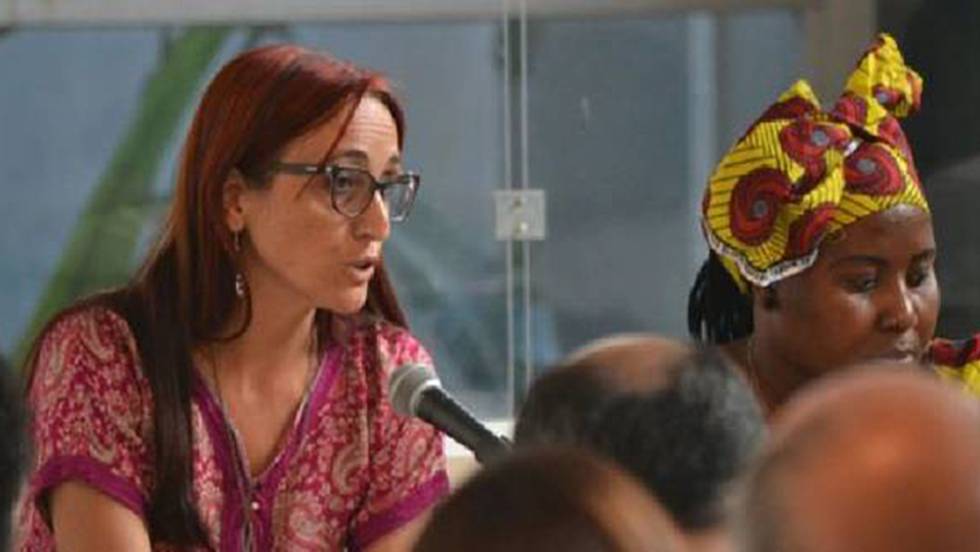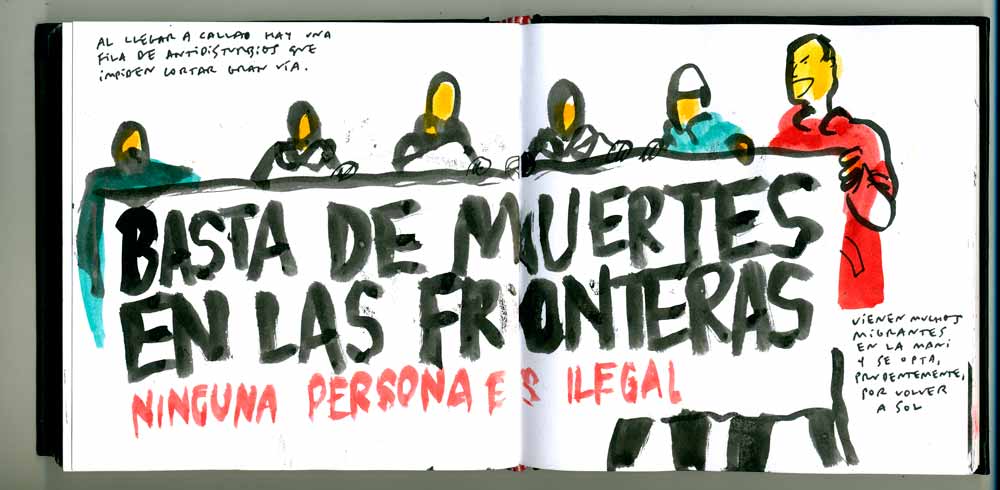
Helena Maleno Garzón at a workshop
The year ends with the surface of the Mediterranean concealing thousands of humans lost, sinking into the sea bottom as it reveals the sinking of our own collective humanity. Last year, over 5000 women, children and men drowned in the Mediterranean. The year before close to 4000, and the year before that, a little over 3000. This year, the reported death toll hovers just over 3000. That “success” is largely due to draconian measures that have sent refugees back to slave markets and brutal prisons in Libya and life-in-death in Morocco. Spain has replaced Italy as the preferred port of entry for those seeking a life, be they called migrants, refugees, or asylum seekers. Such is today’s morbid mathematics that over 3000 innocents drowned in one body of water in one year is touted as “success”. This is who we are … or not. Helena Maleno Garzón is a Spanish activist and journalist based in Tangiers. Working with Caminando Fronteras, a human rights group founded in 2002 that monitors and reports on the Spanish – Moroccan borders, Helena Maleno Garzón has spent the last years documenting, working with, rescuing and insisting on the dignity of migrant, refugees and asylum seekers crossing the Mediterranean into Europe. Helena Maleno Garzón refuses to let all that is human drown in the Mediterranean, and for that refusal, she is described as a criminal by both Morocco and Spain.
Two Spanish cities – Ceuta and Mellila – sit on Morocco’s coast. In 2015, Helena Maleno Garzón described the two enclaves as “the most heavily guarded borders in the EU to keep out African migrants.” Two years ago, Helena Maleno Garzón described a scene of mounting violence, excessive and illegal use of force, and preventable tragedies, such as the massacre of 15 African migrants on February 6, 2014, at the El Tarajal beach, in Ceuta. As a Liberian woman refugee explained, “We are subjected to ongoing institutional violence when we reach the border. This can range from denial of access to basic rights, to torture, physical abuse, and even sexual violence. What you see on the Melilla fence is only a fraction of what we suffer in transit.” In the intervening years, that fraction has grown as it has intensified. After 15 years of engagement in the area, Helena Maleno Garzón and her colleagues at Caminando Fronteras have declared that the area is now a war zone.
And so, the Moroccan government, at the behest of the Spanish government, has charged Helena Maleno Garzón with smuggling and human trafficking. The Spanish government tried the same trick a few years ago, but had to withdraw the charges earlier this year. Earlier this week, the Moroccan court postponed Helena Maleno Garzón’s trial until January 10 of next year. In Morocco and in Spain, many are rising to Helena Maleno Garzón’s defense. Across Spanish social media, #DefendiendoAMaleno appears next to #NoEsDelito. The defense of Helena Maleno Garzón rejects the criminalization of assisting others in need.
Helena Maleno Garzón stands trial for asking which is the greater crime, to cross a border, to assist crossing a border or to maintain that border with lethal force? Spanish policy mirrors European policy, and “what you see on the Melilla fence is only a fraction of what we suffer.” Look into the mirror. Let us move closer to the water’s edge, grasp one another’s hands, encircle the Mediterranean, and speak the names of every child, woman, and man who died in the sea or at the hands of border guards while trying to find haven. Let us do so for the sake of humanity.
(Photo Credit: El Pais / Caminando Borders)
